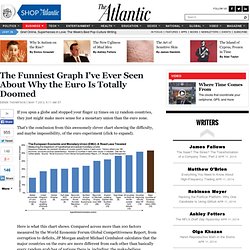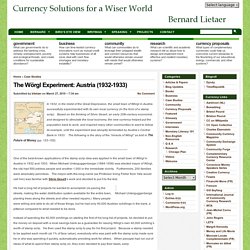

The Funniest Graph I've Ever Seen About Why the Euro Is Totally Doomed - Derek Thompson - Business. If you spun a globe and stopped your finger 12 times on 12 random countries, they just might make more sense for a monetary union than the euro zone.

That's the conclusion from this awesomely clever chart showing the difficulty, and maybe impossibility, of the euro experiment (click to expand). Here is what this chart shows. Compared across more than 100 factors measured by the World Economic Forum Global Competitiveness Report, from corruption to deficits, JP Morgan analyst Michael Cembalest calculates that the major countries on the euro are more different from each other than basically every random grab bag of nations there is, including: the make-believe reconstituted Ottoman Empire; all the English speaking Eastern and Southern African countries; and all countries on Earth at the 5th parallel north.
And here is your tweetable fact: A monetary union might make more sense for every nation starting with the letter "M" than it does for the euro zone. The Wörgl Experiment: Austria (1932-1933) In 1932, in the midst of the Great Depression, the small town of Wörgl in Austria successfully experimented with its own local currency (in the form of a stamp scrip).

Based on the thinking of Silvio Gesell, an early 20th-century economist, and designed to stimulate the local economy, the new currency helped put the population back to work, and inspired many other communities to want to follow its example, until the experiment was abruptly terminated by Austria’s Central Bank in 1933.
The following is the story of the “miracle of Wörgl” as told in The Future of Money (pp. 153-155). One of the best-known applications of the stamp scrip idea was applied in the small town of Wörgl in Austria in 1932 and 1933. When Michael Unterguggenberger (1884-1936) was elected mayor of Wörgl, the city had 500 jobless people and another 1,000 in the immediate vicinity. Furthermore, 200 families were absolutely penniless. Michael Unterguggenberge … does it sound familiar? No Copyright Law: The Real Reason for Germany's Industrial Expansion? - SPIEGEL ONLINE - News - International.
The entire country seemed to be obsessed with reading.

The sudden passion for books struck even booksellers as strange and in 1836 led literary critic Wolfgang Menzel to declare Germans "a people of poets and thinkers. " "That famous phrase is completely misconstrued," declares economic historian Eckhard Höffner, 44. "It refers not to literary greats such as Goethe and Schiller," he explains, "but to the fact that an incomparable mass of reading material was being produced in Germany.
" Höffner has researched that early heyday of printed material in Germany and reached a surprising conclusion -- unlike neighboring England and France, Germany experienced an unparalleled explosion of knowledge in the 19th century. German authors during this period wrote ceaselessly. The situation in England was very different. Equally Developed Industrial Nation Indeed, only 1,000 new works appeared annually in England at that time -- 10 times fewer than in Germany -- and this was not without consequences.
Food Crisis.